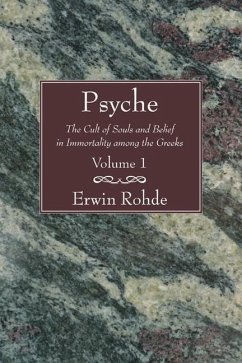In all humane studies, while knowledge advances, certain works retain a classic quality which puts them beyond the reach of time. Much of Psyche possesses this enduring quality. . . . To a large extent Rohde succeeded in his ideal of detachment and brought to light a new and truer conception of the development of Greek religion which in its broad outlines can hardly be shaken. . . . The study of religion is to a great extent a psychological study, and we have the advances of psychology to reckon with. Yet there are some minds large enough to discount much of the progress of the coming years. This perhaps as much as anything is what entitles a work to be called a classic. They have an insight which ensures that new discoveries will enlarge and confirm rather than destroy their work. No psychologist, surely, will quarrel with Rohde's description of the way in which, in religious ceremonies, the elements of ecstasy and intoxication, instead of being suppressed, were turned to therapeutic ends; or how in cathartic rituals no moral purpose was involved. . . . Psyche outlives, and will continue to outlive, criticism, and will never fail to bring interest and enlightenment to its readers. We can all echo the words of Professor E. R. Dodds in his own study of Greek religious psychology: 'I shall of course be standing, as we all stand, on the shoulders of Rohde.' --from the Introduction by W. K. C. Guthrie
Bitte wählen Sie Ihr Anliegen aus.
Rechnungen
Retourenschein anfordern
Bestellstatus
Storno








